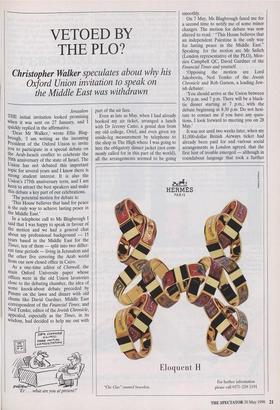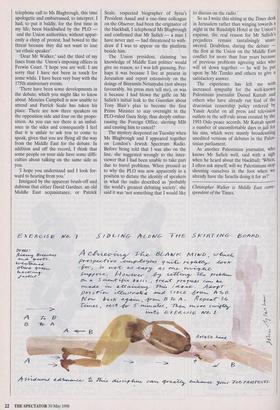VETOED BY THE PLO?
Christopher Walker speculates about why his
Oxford Union invitation to speak on the Middle East was withdrawn
Jerusalem THE initial invitation looked promising when it was sent on 27 January, and I quickly replied in the affirmative. `Dear Mr Walker,' wrote Ellie Blag- brough, 'I am writing as the incoming President of the Oxford Union to invite You to participate in a special debate on the Arab-Israeli conflict to celebrate the 50th anniversary of the state of Israel. The Union has not debated this important topic for several years and I know there is strong student interest. It is also the Union's 175th anniversary term, and I am keen to attract the best speakers and make this debate a key part of our celebrations. `The potential motion for debate is: `This House believes that land for peace is the only way to achieve lasting peace in the Middle East.'
In a telephone call to Ms Blagbrough I said that I was happy to speak in favour of the motion and we had a general chat about my professional background — 15 Years based in the Middle East for the Times, ten of them — split into two differ- ent time periods — living in Jerusalem and the other five covering the Arab world from our now closed office in Cairo.
As a one-time editor of Cherwell, the main Oxford University paper whose offices were in the old Union lavatories close to the debating chamber, the idea of some knock-about debate preceded by Pimins on the lawn and dinner with old chums like David Gardner, Middle East correspondent of the Financial Times, and Ned Temko, editor of the Jewish Chronicle, appealed, especially as the Times, in its wisdom, had decided to help me out with Er . . what are you at present?' part of the air fare.
Even as late as May, when I had already booked my air ticket, arranged a lunch with Dr Jeremy Catto, a genial don from my old college, Oriel, and even given my inside-leg measurement by telephone to the shop in The High where I was going to hire the obligatory dinner jacket (not com- monly called for in this part of the world), all the arrangements seemed to be going smoothly.
On 7 May, Ms Blagbrough faxed me for a second time to notify me of some minor changes. The motion for debate was now altered to read: "This House believes that an independent Palestine is the only way for lasting peace in the Middle East." Speaking for the motion are Mr Safieh (London representative of the PLO), Men- zies Campbell QC, David Gardner of the Financial Times and yourself.
`Opposing the motion are Lord Jakobovits, Ned Temko of the Jewish Chronicle and Rob Garson, a leading Jew- ish debater.
`You should arrive at the Union between 6.30 p.m. and 7 p.m. There will be a black- tie dinner starting at 7 p.m.; with the debate beginning at 8.30 p.m. Do not hesi- tate to contact me if you have any ques- tions. I look forward to meeting you on 28 May.'
It was not until two weeks later, when my $1,000-dollar British Airways ticket had already been paid for and various social arrangements in London agreed, that the first hint of trouble emerged — although in roundabout language that took a further telephone call to Ms Blagbrough, this time apologetic and embarrassed, to interpret. I had, to put it baldly, for the first time in my life, been blackballed by the PLO and the Union authorities, without appar- ently a chirp of protest, had bowed to the threat because they did not want to lose 'an ethnic speaker'.
`Dear Mr Walker,' said the third of my faxes from the Union's imposing offices in Frewin Court. 'I hope you are well. I am sorry that I have not been in touch for some while. I have been very busy with the 175th anniversary events.
`There have been some developments in the debate, which you might like to know about. Menzies Campbell is now unable to attend and Patrick Seale has taken his place. There are now three speakers on the opposition side and four on the propo- sition. As you can see there is an imbal- ance in the sides and consequently I feel that it is unfair to ask you to come to speak, given that you are flying all the way from the Middle East for the debate. In addition and off the record, I think that some people on your side have some diffi- culties about talking on the same side as you.
`I hope you understand and I look for- ward to hearing from you.'
Intrigued by the apparent brush-off and dubious that either David Gardner, an old Middle East acquaintance, or Patrick Seale, respected biographer of Syria's President Assad and a one-time colleague on the Observer, had been the originator of the blackball, I telephoned Ms Blagbrough and confirmed that Mr Safieh — a man I have never met — had threatened to with- draw if I was to appear on the platform beside him.
The Union president, claiming 'no knowledge of Middle East politics' would give no reason, so I was left guessing. Per- haps it was because I live at present in Jerusalem and report extensively on the doings of Binyamin Netanyahu (not always favourably, his press men tell me), or was it because I had blown the gaffe on Mr Safieh's initial leak to the Guardian about Tony Blair's plan to become the first Prime Minister to stay overnight in the PLO-ruled Gaza Strip, thus deeply embar- rassing the Foreign Office, alerting MI6 and causing him to cancel?
The mystery deepened on Tuesday when Ms Blagbrough and I appeared together on London's Jewish Spectrum Radio. Before being told that I was also on the line, she suggested wrongly to the inter- viewer that I had been unable to take part due to travel problems. When pressed as to why the PLO was now apparently in a position to dictate the identity of speakers in what the radio described as 'probably the world's greatest debating society', she said it was 'not something that I would like to discuss on the radio.'
So as I write this sitting at the Times desk in Jerusalem rather than winging towards a night in the Randolph Hotel at the Union's expense, the real reason for Mr Safieh's prejudices remain tantalisingly unan- swered. Doubtless, during the debate — the first at the Union on the Middle East conflict for more than four years because of previous problems agreeing sides who will sit down together — he will be put upon by Mr Temko and others to give a satisfactory answer. The experience has left me with increased sympathy for the well-known Palestinian journalist Daoud Kuttab and others who have already run foul of the draconian censorship policy ordered by Yassir Arafat on all press and television outlets in the self-rule areas created by the 1993 Oslo peace accords. Mr Kuttab spent a number of uncomfortable days in jail for his sins, which were mainly broadcasting unedited versions of debates in the Pales- tinian parliament. As another Palestinian journalist, who knows Mr Safieh well, said with a sigh when he heard about the blackball: 'When, I often ask myself, will we Palestinians stop shooting ourselves in the foot when we already have the Israelis doing it for us?'
Christopher Walker is Middle East corre- spondent of the Times.



































































 Previous page
Previous page